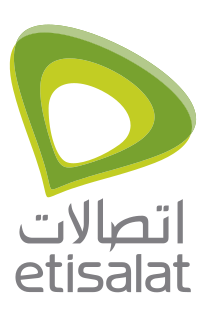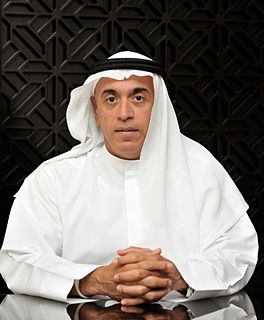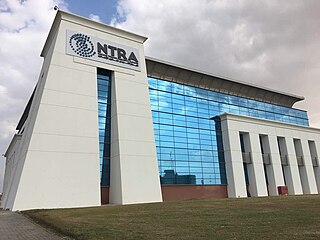India's telecommunication network is the second largest in the world by number of telephone users with 1179.49 million subscribers as on 31 January 2021. It has one of the lowest call tariffs in the world enabled by mega telecom operators and hyper-competition among them. India has the world's second-largest Internet user-base with 747.41 million broadband internet subscribers in the country.
Telecommunications in Pakistan describes the overall environment for the mobile telecommunications, telephone, and Internet markets in Pakistan.
Telecommunications in Saudi Arabia have evolved early in the Kingdom since the establishment the Directorate of Post, Telephone and Telegraph (PTT) in 1926.
Telecommunications in the United Arab Emirates (UAE) is under the control and supervision of the Telecommunications Regulatory Authority (TRA) which was established under UAE Federal Law by Decree No. 3 of 2003. From 1976 to 2006 the Emirates Telecommunications Corporation (Etisalat) was the sole telephone and telecommunications provider for the UAE. And while there were exceptions for free zones and modern housing developments, for the majority of the UAE, Etisalat held a monopoly on business and personal telecommunications services. In February 2006, this monopoly became a duopoly when a new telephone company and Internet service provider (ISP), du, was established to offer mobile services across the UAE and Internet and TV services to some free zone areas. However, due to geographical distribution of service areas, the companies do not compete for customers and thus effectively operate as monopolies. Earlier du provided triple play services to free zone areas under the name Emirates Integrated Telecommunications Company (EITC), which is still its legal name.

Emirates Telecommunication Group Company PJSC, branded trade name Etisalat, is a multinational Emirati based telecommunications services provider, currently operating in 15 countries across Asia, the Middle East and Africa. As of February 2014, Etisalat is the 14th largest mobile network operator in the world, with a total customer base of more than 167 million. It is the only net provider in UAE. Etisalat was named the most powerful company in the United Arab Emirates by Forbes Middle East in 2012.

.ae is the country code top-level domain (ccTLD) in the Domain Name System of the Internet for the United Arab Emirates. It is administered by .aeDA which is part of the UAE Telecommunications Regulatory Authority.

Ahmad Abdullah Juma Bin Byat is an Emirati firmly established in the UAE’s business environment, holding directorial positions in several prominent Dubai organisations.
The Telecommunications Regulatory Authority of the Kingdom of Bahrain, commonly known as the TRA is the official independent body recognized by the Government of Bahrain as the entity responsible for regulating the telecoms sector in the Kingdom.

Emirates Integrated Telecommunications Company, commercially rebranded as du February 2007, is one of the two telecom operators in the United Arab Emirates. du offers fixed line, mobile telephony, internet and digital television services across the United Arab Emirates. It has a sister concern named Edara established in 2018. Edara is a subsidiary of Emirates Integrated Telecommunications Company (EITC) commercially branded as Telco Operations.
Use of the Internet in Qatar has grown rapidly and is now widespread, but Internet access is also heavily filtered.

The Internet in Afghanistan was introduced in 2002 after the Karzai administration took office in Kabul. It was banned prior to 2002 because the previous Taliban government believed that it broadcast obscene, immoral, and anti-Islamic material, and because the few internet users at the time could not be easily monitored as they obtained their telephone lines from neighboring Pakistan.
Following its independence from British occupation in 1971, the United Arab Emirates’ mass media landscape had already started some of its media sectors and continued to develop steadily. Since then, much of the UAE's media outlets fall under government-owned umbrella groups as well as regulation by the National Media Council and its extensions. The major types of UAE media are print press, radio, television, internet and social media.
The Indian Telecommunications Service, widely known as ITS, and earlier known as 'Telegraph Engineering Service Class I' is a Central Civil Service (gazetted)under Group 'A' of the executive branch of the Government of India. The appointment to this service is done through Combined Engineering Services Exam held every year by Union Public Service Commission (UPSC) of India. The service was created to meet the technical and managerial functions of the government in areas related to telecommunications.The Department of Telecommunications (DOT) had been managed, both technically and administratively, for years by this permanent cadre of civil servants called the Indian Telecom Service (ITS).
The Communications Authority of Kenya (CA) is the regulatory Authority for the ICT industry in Kenya with responsibilities in telecommunications, e-commerce, broadcasting and postal/courier services. The CA is also responsible for managing the country’s numbering and frequency spectrum resources, administering the Universal Service Fund (USF) as well as safeguarding the interests of users of ICT services.

The Tanzania Communications Regulatory Authority (TCRA), established by the TCRA Act No. 12 of 2003, is an independent Authority for the postal, broadcasting and electronic communications industries in the United Republic of Tanzania. It merged the former Tanzania Communications Commission and the Tanzania Broadcasting Commission. The TCRA is accountable to the Communications and Technology Ministry. The Information Communication and Technology (ICT) sector reform in Tanzania is notable in that development was influenced by regional, political (national) and technological factors. Tanzania is one of the few African countries to liberalise the communications sector whereby the Converged Licensing Framework (CLF) is used as a key strategy, in terms of the Tanzania Communications Regulations. Since inception in 2003, the TCRA has issued a number of regulations to administer the sector, but still faces a number of challenges such as the roll-out of services to under-serviced rural areas.

The Egyptian Ministry of Communications and Information Technology (MCIT) is the government body responsible for information and communications technology (ICT) issues in the Arab Republic of Egypt. Established in 1999, MCIT is responsible for the planning, implementation and operation of government ICT plans and strategies. MCIT is led by the Minister of Communications and Information Technology, who is nominated by the Prime Minister and is a member of the cabinet. The current ICT Minister is Amr Talaat who assumed the position on 14 June 2018. MCIT is headquartered in Smart Village Egypt, in 6th of October, Giza Governorate, in the Cairo metropolitan area.

The Telecommunications Regulatory Authority of Lebanon is an independent public institution established by Law 431/2002 and legally mandated to liberalize, regulate, and develop telecommunications in Lebanon. The TRA effectively started operations upon the nomination of its board members in February 2007.

The National Telecommunications Regulatory Authority, commonly known as NTRA, is the Egypt government-approved regulatory and competition authority that was established in accordance of the Egyptian telecommunication regulation law No. 10/ 2003 as the national authority equipped to regulate and administer the telecommunications region. Regulating the competition environment between the operators inside the industry according to the Egyptian constitution was a huge mandatory case after the huge rate of telecommunication technology growth, as well as ensuring the availability of qualitative and green telecommunications services.
Communication and Information Technology Regulatory Authority (CITRA) (Arabic: الهيئة العامة للاتصالات وتقنية المعلومات, it is an independent governmental entity in Kuwait









